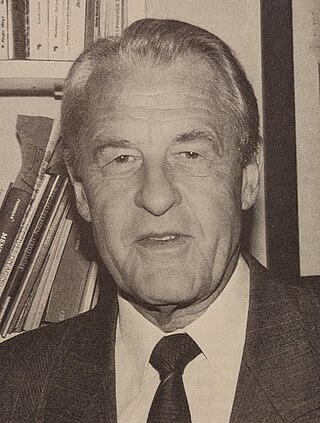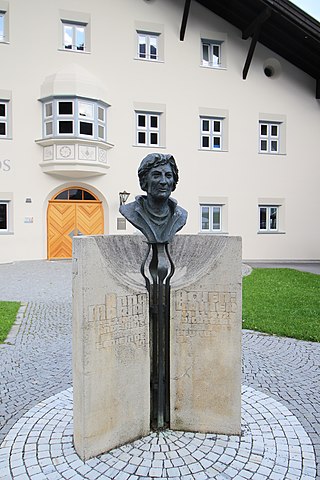
Em(m)anuel Löwy, or Emanuel Loewy was a classical archaeologist and theorist who employed the methodology of universal psychological sources of form in his work.

Ernst Adolf Alfred Oskar Adalbert von Dobschütz was a German theologian, textual critic, author of numerous books and professor at the University of Halle, the University of Breslau, and the University of Strasbourg. He also lectured in the United States and Sweden.

Rolf Rendtorff (1925–2014) was Professor of Old Testament at the University of Heidelberg from 1963 to 1990. He was one of the more significant German Old Testament scholars from the latter half of the twentieth-century and published extensively on various topics related to the Hebrew Bible. Rendtorff was especially notable for his contributions to the question of the origins of the Pentateuch, his adoption of a "canonical approach" to Old Testament theology, and his concerns over the relationship between Jews and Christians.
Fritz Schachermeyr was an Austrian historian, professor at the University of Vienna from 1952 until retirement.

Friedrich Carl Knauer was an Austrian zoologist.
Hermann Junker was a German archaeologist best known for his discovery of the Merimde-Benisalam site in the West Nile Delta in Lower Egypt in 1928.
Henri Lauener was a Swiss philosopher interested in both transcendental and analytic currents. He has been the editor of the journal Dialectica. A Lauener Foundation for Analytical Philosophy has been developed, which awards a biennial prize to outstanding life works in this field.
Kurt Lüthi was a Swiss Reformed theologian and a professor at the University Vienna.
Emerich Coreth was an Austrian Philosopher, Jesuit and Catholic Priest. He is well known for his works on metaphysics and philosophical anthropology. A close associate of Karl Rahner, Coreth is a renowned neo-Thomist of 20th century. He was the Rector of the University of Innsbruck and the Provincial of the Austrian Province of the Society of Jesus.
Gabrielle Oberhänsli-Widmer, is Professor of Jewish studies at the University of Freiburg.

Evangelisches Gesangbuch is the current hymnal of German-language congregations in Germany, Alsace and Lorraine, Austria, and Luxembourg, which was introduced from 1993 and 1996, succeeding the Evangelisches Kirchengesangbuch (EKG). Evangelisches Gesangbuch appears in 14 different regional editions, which add regional hymns to the 535 hymns common for all editions.

Anna Maria Achenrainer was an Austrian writer.
Gertrud Fussenegger was an Austrian writer and a prolific author, especially of historical novels. Many commentators felt that her reputation never entirely escaped from the shadow cast by her enthusiasm, as a young woman, for National Socialism.

Walter Hinck was a German Germanist and writer. He was professor of German literature at the University of Cologne from 1964 to 1987.

Arthur Ernst Rutra, born Samuely, was a leading Austrian Expressionist playwright and author. He was also a publisher and journalist. He was born on 18 September 1892 in Lemberg in Austria-Hungary now Ukraine and was murdered on 9 October 1942 in the Maly Trostinets extermination camp near Minsk.
Walther Killy was a German literary scholar who specialised in poetry, especially that of Friedrich Hölderlin and Georg Trakl. He taught at the Free University of Berlin, the Georg-August-Universität Göttingen, as founding rector of the University of Bremen, as visiting scholar at the University of California and Harvard University, and at the University of Bern. He became known as editor of literary encyclopedias, the Killy Literaturlexikon and the Deutsche Biographische Enzyklopädie.

Georg Hüsing was an Austrian historian and philologist who specialized in Germanic studies and mythography.
Carl Julius Haidvogel was born to Carl Haidvogel and Juliana on 13 September 1891 in Vienna, Austria. From 1912, Haidvogel worked as a registrar for the municipality of Vienna, was a part-time editor at the public educational institute and observatory Urania, and a dramaturge at the Bühne der Jungen. He started publishing his famous literary works in 1918. In the 1920s, he came into contact with the "Weekend and Settlement Movement" of the Viennese municipal Councillor Anton Weber, which also influenced his work. In 1937, Haidvogel joined the "Union of German Writers in Austria". Although Haidvogel was not among the contributors to the Confession Book of the "Union of German Writers of Austria" (BdSÖ), he was one of the signatories of the "Confession of the Union of German Writers to the Führer", published in Grazer Tagespost on 27 March 1938. Haidvogel was friends with Josef Weinheber and Karl Heinrich Waggerl. Haidvogel's work "The Pillars of God" was placed on the list of banned authors and books in Austria in 1946. In 1956, Haidvogel was retired. In 1971, he received the Austrian Decoration for Science and Art. He welcomed his son Gerhard with wife Lotte on 14 January 1921; Gerhard became the famous Austrian architect Gerhard Haidvogel. Carl Julius Haidvogel died on 26 December 1974 in Graz.
Hartmut Lehmann is a German historian of modern history who specializes in religious and social history. He is known for his research on Pietism, secularization, religion and nationalism, transatlantic studies and Martin Luther. He was the founding director of the German Historical Institute Washington DC and was a director of the Max Planck Institute for History. He is an emeritus honorary professor at Kiel University and the University of Göttingen.

Lydia Mischkulnig is an Austrian writer living in Vienna. The winner of the Bertelsmann-Literaturpreis writes mainly novels, narratives and radio plays.









